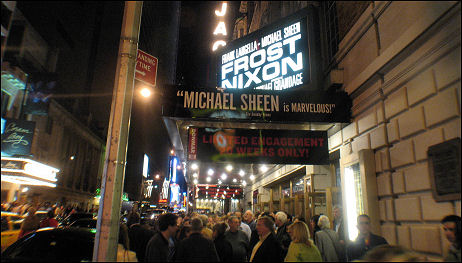Jackson Bones
New York‘s “News Reel” column has taken a look at the script for The Lovely Bones, am 112-page adaptation of Alice Sebold‘s novel by Peter Jackson, Fran Walsh and Philippa Boyens, and declared that it “looks to be not nearly as good as Heavenly Creatures.” I too have a copy of The Lovely Bones (sent to me a few days ago). It’s difficult for me to invest any enthusiasm in a project that the dreaded Jackson has an interest in, but I’ll try to read it and write an assessment within the next few days.
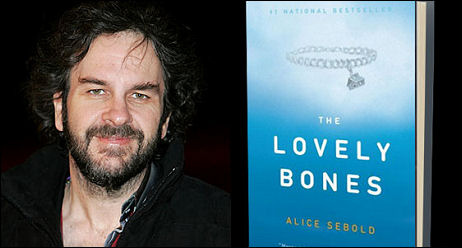
H’wood Reporter editorship up for grabs
The Hollywood Reporter isn’t what it used to be, but there’s still plenty of interest in the trade paper’s top editorial job,” says a 5.4 Radar item by Jeff Bercovici. “A number of Los Angeles Times staffers are said to have thrown their hats into the ring, perhaps worried about what might become of the Times now that it (and parent Tribune Co.) have been taken over by Sam Zell. (One, staff writer Claudia Eller, says she was contacted by a search firm, not the other way around.) New York Times scribe Sharon Waxman‘s name has also come up.
“Asked whether she was in the running, Waxman says, ‘There’s nothing going on there.’ (Intriguingly, she adds, “If that were true, I don’t think I’d let you break it.”) The job is said to pay around $200,000 a year. ‘If it were not for the money, no serious journalist would take it,’ says one embittered insider. ‘The new owners are only interested in using the paper to help promote their seminars and other profit-making enterprises.'”
Anne Thompson on bloggers
Last night Anne Thompson posted a new “Thompson on Hollywood” column that assesses the Hollywood blogosphere, and how bloggers (a term that I will never be fully comfortable with) are re-shaping film coverage. It’s a smart, comprehensive and fair-minded look at things, but I might as well take this opportunity to respond to (i.e., clarify) some of the things she’s said about myself and Hollywood Elsewhere.
“Such kudos bloggers as Oscarwatch.com‘s Sasha Stone have become factors in the Oscar race, because they are read by younger Academy members as well as the media,” Thompson says in paragraph #27. And right after this she says that “DreamWorks has accused outspoken blogger Jeffrey Wells of HollywoodElse- where.com of dive-bombing Oscar hopeful Dreamgirls with his negative postings.”
Wells response: In other words, former DreamWorks marketing chief Terry Press has accused me of dive-bombing Dreamgirls in conversations with other journal- ists? Because she never said squat to me. I was not a huge fan of Dreamgirls but I always wrote about it with respect. I certainly never dive-dombed it. My dive-bomb target was Eddie Murphy, but I’m not going to get into that one again.
“A former trade journalist, freelancer and avid movie buff, Wells runs his independent website and blog,” Thompson continues. “His sources are many and his information is (mostly) solid. Wells ekes out a living off the ads the studios buy on his site. They also provide access to screenings, parties and talent. Wells respects studio release date embargoes because if he didn’t, he’d lose their invites.”
Wells response: “Ekes out a living” was a fair way to describe my income and living situation from the time I started HE in August 2004 until roughly a year ago. The numbers have surged since March ’06 when I went into the bloggy-bloggy format and dropped the two-columns-per-week deal. I’m not flush but things are starting to get a bit more comfortable.
“But Wells sounds off when he feels like it, which means that some studios deal with him gingerly,” Thompson observes. “Sony, for one, has taken him off its screening list (for the second time; he enraged a prior studio management team with a debunked story about a disastrous Last Action Hero screening).”
Wells response: I’ve given up trying to explain the Last Action Hero hullaballoo that went down in the summer of ’93. The story that I wrote in the L.A. Times Calendar section — about an alleged-but-ultimately-mythical screening of LAH in Pasadena — invoked the legend and the metaphor of Rod Serling and The Twilight Zone. I chose to invoke Serling and his show because the stuff I was hearing didn’t add up — it wasn’t hard or nail-able. But my hardhead editors — Claudia Eller, Kelly Scott –wanted to run a “bust” story and knew only about working within the journalistic strategems of big-city entertainment reporting as it was practiced in 1993 and therefore they couldn’t roll with whimsical or fanciful or quizzical, and so the story that ran didn’t quite have the right coloration.
I don’t think that The Twilight Zone and concepts of hard factual reporting reside on the same planet. If I had written that damn story on my own….if the internet and Hollywood Elsewhere had existed back then, that whole stupid episode would never have happened because I would have written it the right way and people would have responded, “Oh, some people think that an LAH screening happened, or at least they’re trying to convince others that it did,” etc. It would have been about certain people in this town wanting to take that movie down, rather than some purportedly fact-based, page-one, hard-news story.
“Wells falls somewhere between enthusiastic fan and dogged film reporter. In other words, he’s a blogger,” says Anne. Fair enough, although I will hate that word to my dying day.
“So is Nikki Finke, another refugee from the journalistic establishment. Her well-read DeadlineHollywoodDaily.com is loosely affiliated with the L.A. Weekly (which publishes her print column), but is owned by Finke. When the studios deal with solo owner-operators such as Poland, Wells or Finke, there is no editor-in-chief or publisher to approach. They are in complete control of their domain. All a movie company can use for leverage is the old threat of withholding advertising — or access.
“While lack of editorial oversight can yield some ‘facts’ that are merely hearsay or opinion, it also brings an often refreshing candor, a freedom of expression and a lack of politesse. With Poland, Wells and Finke’s burgeoning readers, some folks in Hollywood are finding it difficult to resist their siren call. They feed them and try to spin them.
“They are as much a part of the entertainment community as the rest of us. And be sure of this: More bloggers are on the way.”
Tom Tapp Premiere/Us story
I meant to link to this Tom Tapp/Hollywood Wiretap story yesterday about Premiere subscribers being angry because Jann Wenner has bought their addresses and subscription deals and will be sending them Us magazine instead. I didn’t get to it because I was packing and running around, but also because anyone who pays money to receive mailed copies of paper publications is living in the past anyway so what do I care? On top of which it’s not that startling to hear that a corporation is trying to invade and re-arrange the reading materials of old-school magazine subscribers.
Leaf transportation
A very big hint about my current whereabouts is in the size and radiant color of the leaves on this tree. Okay, a tree growing in Brooklyn. There goes the guesswork.

Meditative moment this morning on the way back from El Brilliante, the Montrose Ave. breakfast joint, and my last decent L.A. shot — taken Thursday, 5.3.07, 5:20 pm
One of the things I truly love about being back east is the way everything starts popping through in late April-early May. Not to dismiss those blue-violet Jaracanda blossoms that explode sometime around May or June in Beverly Hills. but the east-coast spring flora colors have this transporting quality. They’re enough to make you stop power-walking and just stop and and let it all in,which is precisely what I did this morning around 8:15 ayem.
Summer Predictions
Last week L.A. Times columnist Deborah Netburn asked the usual web suspects — David Poland, myself, Garth Franklin, myself, Leonard Klady, etc. — for opinions about the likely big winners, losers and surprises of the coming summer season. The piece went up today. Here’s the opening page, and here’s the page with my blah-blah.
Netburn quoted me quite liberally (thanks!) but here’s a portion that got cut: “The question shouldn’t be about how many hundreds of millions the obvious biggies — Spider-Man 3, Pirates of the Caribbean: At World’s End, Transformers, etc. — are going to make. The question should be how do audiences really and truly feel about contributing to the wealth of the mega-corporations and special-effects house and superstars who are going to profit from their lemming-like patronage?”
Lamenting bullet titles
Toronto Star critic Peter Howell is lamenting the current dominance of one- or two-word bullet movie titles like Next, Vacancy, Fracture, Disturbia, The Invisible and The Condemned. “Whatever happened to movies with evocative titles like The Trouble With Harry, The Man Who Knew Too Much or Whatever Happened to Baby Jane?,” he’s asking.

Howell asked me for a quote about this and posted a portion of what I sent him, but here’s the whole schpiel:
“Hollywood has always kept titles down to two or three words. Occasionally a four-worder like The Guns of Navarone slipped through in the ’60s, but more often not. That said, if some American producer were to remake Shoot The Piano Player today, it would probably be called Piano Man or Chords or something along those lines.
“Hollywood marketers have been on a campaign against marginally high-falutin’-ish titles for a good 25 or 30 years, or roughly since the advent of the mass-market blockbuster movie syndrome, which kicked off with Jaws in ’75 and then Star Wars in ’77.
“Why did Columbia and Taylor Hackford drop the allusive and haunting Out of the Past (’47) in favor of the more macho, two-fisted sounding Against All Odds when they did their 1984 remake ? Four syllables, one word shorter…that was one of the first modern-age dumb-down moves along these lines that I can remember.
“How about Bertrand Tavernier‘s currently shooting In the Electric Mist, with Tommy Lee Jones in the lead role? James Lee Burke‘s original book title is “In The Electric Mist With the Confederate Dead” — a fantastic title. Couldn’t fit on the marquee but wow, what a great choice of words!
“One-word bullet titles are easier to remember for people who haven’t made much of an education, and of course shorter is almost always better in our attention-deprived world, but titles with poetic or allusive qualities are even less in favor now than ever before.
“The reason is because of the under-35 cyber generation is a shorthand generation in more ways than one. The relentless clutter of information and images that pour into our computers and PDAs demands a savage pruning on the part of the reader, video-watcher and movieoger. They speak cyber-ebonic in their text messaging — “r u coming to the party?”, “LOL”, etc. — and this is the kind of language by which they process the world. Marketers, one could argue, are simply following suit.
“I personally prefer Do Androids Dream of Electric Sheep? to Blade Runner, but that’s just me.”
Stevens on Raimi
“Scrap the Black Vines of Doom and Spider-Man 3 becomes a fable about how success makes monsters of us all (a story that Sam Raimi, helming one of the top-grossing franchises in movie history, no doubt knows something about.)” — from Dana Stevens‘ Slate review. Sounds like she may have been alluding to bitter Danny Elfman comment about Raimi having become a changed man between the making of the original Spider-Man and the sequel.
Black Sheep are coming
I saw about 25 minutes worth of Jonathan King‘s Black Sheep at the Toronto Film Festival last September (I was killing time, waiting to see something else), but what I saw and heard wasn’t bad. I laughed; I rolled with the gore. It didn’t seem quite as nimble-witted and character- driven and quick with the quip as Tremors, my all-time favorite mock-horror monster-predator film, but it’s close, or at least in the same ballpark.
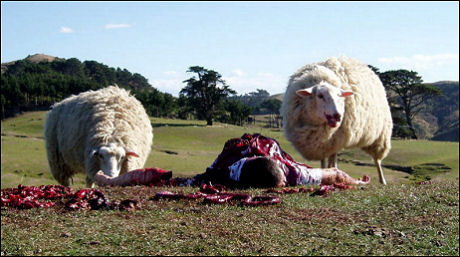
IFC First Take is opening Black Sheep in the U.S. on 6.22.07, and yet the only official website I could find alludes only to the late March opening in New Zealand. Here’s the trailer — you can tell it’s pretty good right off the top. Here’s a little baahing I did a few minutes ago.
In the late ’80s I tried writing a similar-type script called Killer Chickens — a good idea (it used a very similar plot to Black Sheep re genetic engineering) but either I’m not a good enough scriptwriter or I didn’t try hard enough.
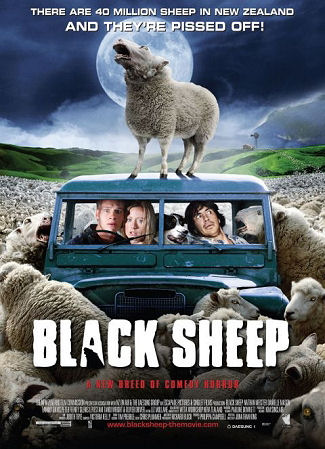
Sasha Stone vs. AMPAS
Oscarwatch.com‘s Sasha Stone doesn’t appear to consider me a friend or a supporter any longer because she didn’t send me those May 1st AMPAS lawsuit papers from Quinn Emanuel Urquhart Oliver & Hedges, LLP. Probably because of that pissy business from two or three days ago. But I am her supporter and ally as far as her problem with the Academy is concerned.
They’re bullies, these guys….throwing lawyers and lawsuits at a single mom who intelligently promotes the Oscar hoo-hah like a clean machine and who makes the Academy membership and their emotional-whimsical preferences seem much more important than they actually are in the grand scheme. or in any scheme. Shame on the Academy poobahs who pushed and hammered this thing along. Could they be trying to get themselves nominated for a 2007 Odious Award?
I think Sasha’s going to have to change her domain name. I told her months ago she should go for www.sashastone.com. Nice and recognizable..no fuss.
Here’s page one, page two, page three and page four.
Parker Posey
I’ve just returned from a 20-minute junket quickie with Parker Posey. The general plan was to talk about Fay Grim (Magnolia, 5.18), her new Hal Hartley movie, but we kind of veered from topic to topic. Here’s the mp3 of our…I was going to say “discussion.” Call it a chat or a ping-pong match with nobody trying to win.
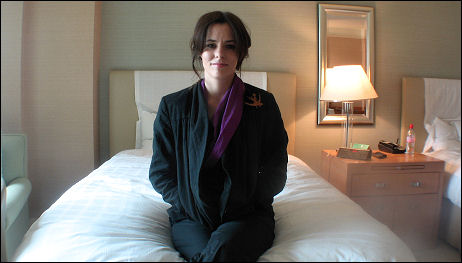
Parker Posey in a sixth-floor bedroom at the Parker Meridien hotel., West Hollywood — Thursday, 5.307, 2:455 pm
I don’t mean to ignore Fay Grim, which is dry and quirky-funny and not at all half bad. It’s just have to wait until it’s time.


